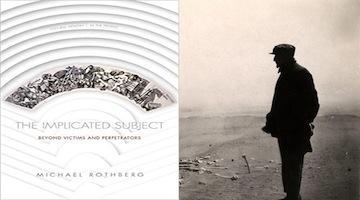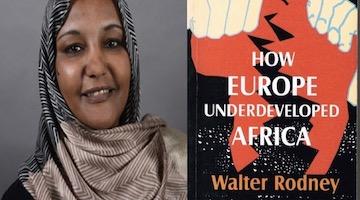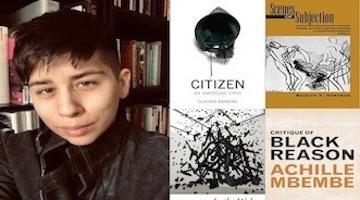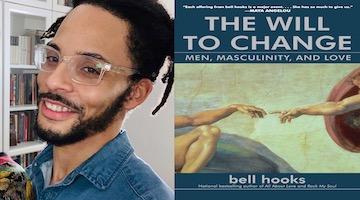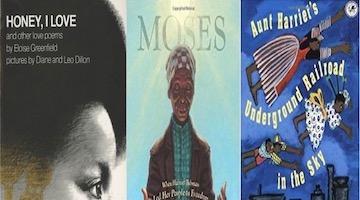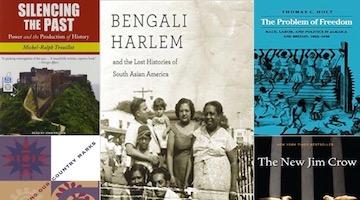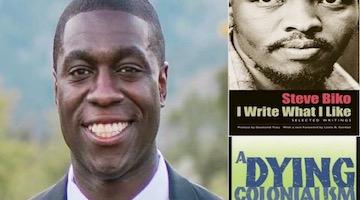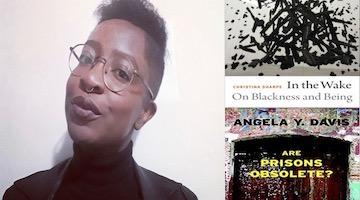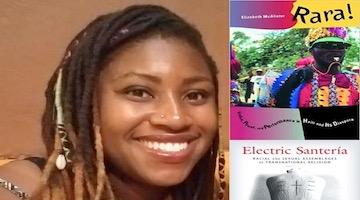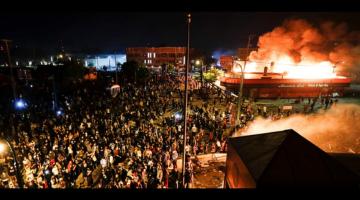For me, the most generative way to read, the most thorough, is to teach a text, to read in communion with others.
“How is Marx read, yes, but also, how does Marx read?”
In this feature, we ask educators to list books they most enjoy teaching in their communities. Contributors include professors, graduate students, artists, journalists, organizers, activists, and other community leaders. Readers of the Black Agenda Report understand that the university classroom isn’t the only place where learning happens. Submissions therefore include lists of books that are taught at community workshops, mosques, churches, prisons, libraries, the local preschool, or even a weekly book study on one’s front porch. This week’s contributor is Tiana Reid.
A Brief History of Seven Killings by Marlon James
When my dad first got cancer and I knew he’d be spending a lot of time in the hospital, I gave him some organic food, a car magazine, and Marlon James’s A Brief History of Seven Killings (2014), a novel about Bob Marley’s attempted assassination. He devoured both the food and the magazine but James’s 688-page book still sits in his room as pristine as ever. I don’t think I’ve ever seen my dad read anything besides his phone, I realize now. My dad didn’t get a bachelor’s degree and he struggled to finish high school—or more precisely, the system struggled him, a recent immigrant being shuffled around Toronto’s public schools. Now a business owner in Jamaica, he’s one of the smartest people I know but I don’t think he’ll ever read A Brief History, and why should he? Why did I want him to? He was born in Jamaica in 1960 and the book is mainly set in the 1970s so I guess he lived this book in a sense. He lives it.
I wondered, why didn’t I give him The Book of Night Women (2009), my favorite of James’s books? I thought perhaps A Brief History's violently masculine tone, the metronomic stride of events, and the use of patois would be appealing to my machismo father. So, I didn’t teach this book, even if I tried. An important lesson because as a young teacher with not much experience, I approach teaching as a kind of failure. Sometimes your students don’t have time, they don’t have energy, they don’t care, they just don’t want to. Sometimes, as in the case of my father, your students refuse to be taught. As an epigraph to A Brief History reads, “if it no go so, it go near so.”
The New Negro: Voices of the Harlem Renaissance edited by Alain Locke
I gave my very first lecture on The New Negro: Voices of the Harlem Renaissance, edited by Alain Locke. I was a TA for an undergraduate course about methods of literary interpretation (a prerequisite to the English major) and thought it would be a good experience to practice my nonexistent lecture skills. This week—dubbed Cultural Studies/African American Studies by the prof—was couched between James Joyce and Gertrude Stein. Like anyone trained in an elite institution, I have a tendency to overcomplicate. I tried to shake it out of me. I tried to be as simple as possible, without being dumb. I gave some context on the historical moment: what were the social, political and cultural conditions that made the Negro new? If literary critic Arnold Rampersad writes in the introduction that white people “were probably the major target” of the book, then how do we contend with the anthology’s penchant for bourgeois respectability? How can we read The New Negro today when we see more clearly liberalism’s failure to produce a rights-bearing citizen?
“What were the social, political and cultural conditions that made the Negro new?”
I assigned “Spunk,” an early short story by Zora Neale Hurston, for insight into its threats of gossip, its unmoored approach to writing out black vernacular. During lecture, I recall I said something “for the Hurston stans.” That got a couple laughs. But my favorite thing about teaching The New Negro is to consider the anthology form as a mode to mark time and delimit borders amongst diverse things, playing that dance between what it excludes and what it includes. To that effect, we read the paratext: cover, title, front matter, forward, table of contents, bibliography, etc.
And, as always with my teaching practice, a failure, this time marked by disappointment: the professor of the course (who has since been found responsible for sexual assault) then took over to focus on some of the poetry. He said something about an “Uncle Tom,” completely unnecessarily, and for which I got several complaints in office hours.
for colored girls who have considered suicide/when the rainbow is enuf by Ntozake Shange
I most recently “taught” for colored girls as a graduate student leader of a book club for undergraduates. Before this experience my memories of book clubs were tied to being in the corner of my mother’s own book club when she couldn’t find childcare. I would often be the only kid among this group of women. I was always reading my own lit, often Archie Comics. With all this in mind, I tried to approach the for colored girls facilitation as “chill” as I could. After we collectively figured out what a “choreopoem" is, I passed around print-outs of my favorite sections: “de library waz right down from de trolly tracks.” There, the lady in brown character elegantly describes two different Toussaints: Louverture, the revolutionary leader, and Toussaint, a plain old black boy.
TOUSSAINT L’OUVERTURE
waz the beginnin uv reality for me
in the summer contest for
who colored child can read
15 books in three weeks
i won & raved abt TOUSSAINT L’OUVERTURE
at the afternoon ceremony
waz disqualified
cuz Toussaint
belonged in the ADULT READING ROOM
& i cried
& carried dead Touissant home in the book
he waz dead & livin to me
From there, with all of this voice, book club was chill. A few weeks later, I went to see the for colored girls revival performed at New York’s Public Theater, which was cool, but I didn’t learn half as much as I did during book club.
She Tries Her Tongue, Her Silence Softly Breaks by M. NourbeSe Philip
I can’t stop reading this book of poems. I read it to remember myself. I read it to forget myself. I read it to write about it. I read it to write about something else. I read it to theorize. I just can’t stop. And yet for me, the most generative way to read, the most thorough, is to teach a text, to read in communion with others.
I like to start teaching with a quote from an interview with the author. “Why should we trust writing?,” Philip asks. “There’s nothing in our history that suggests we should trust it, because writing is so integrally linked to being enslaved.” Another kind of failure, a generative refusal that uses physical and linguistic domination and turns it into ritual, turns it around, turns it over. Enslavement is not a metaphor, we learn, reading this book as a book. How is the book organized? Why does one section lead into another? Poetry often gets taught through singular poems, this one or that one, but Philip’s She Tries Her Tongue demands to be taught in its entirety, and even beyond that. Philip has many audio recordings on her website. In one class, we tried to read out loud together, fumbling over which section to read, when to read it, fumbling over Philip’s deracination of language.
Capital, Volume One by Karl Marx
Okay, fine! I don’t teach the whole book but I have been assigned (and read!) the whole book—thanks to Étienne Balibar. The first chapter of Marx’s Capital is at the same time underrated and overrated. For an undergrad English class that had really nothing to do with Marx, I assigned the fourth and final section of the first chapter on commodities: “The Fetishism of Commodities and the Secret Thereof.” Almost all undergrads at Columbia have some sense of commodity fetishism as a concept even if they’ve never read Marx. Actually reading Marx demystifies Marxism, I think.
Leaving use-value behind, Marx focuses on the commodity-form deploying fetishism as a kind of apparatus for analyzing, studying, and reading political economy. The first sentence tells us to slow down: “A commodity appears, at first sight, a very trivial thing, and easily understood.” The second tells us why, prompting us read on: “Its analysis shows that it is, in reality, a very queer thing, abounding in metaphysical subtleties and theological niceties.” As we close read, I ask the students to pay attention to language and translation all the while keeping the larger stakes in mind. Why can’t we perceive value as a social relation? Why does he bring up Robinson Crusoe? How is Marx read, yes, but also, how does Marx read?
Along with the chapter, I like to hand out a little quote from Gayatri Chakravorty Spivak’s “Supplementing Marxism:” “…when we talk about Marxism at academic conferences in the United States, we so often lay out grand plans whose agents, if they exist, never come to these conferences. Or we lay plans which presupposed incredible systemic changes.” This helps ground us, I hope, and makes us realize we are sitting around in an expensive but rundown classroom, reading pages in a book.
Tiana Reid is a PhD candidate in English and Comparative Literature at Columbia University where she conducts research in black studies, Marxism, and feminism. She has written for American Quarterly, Art in America, Bookforum, The Nation, The Paris Review, T: The New York Times Style Magazine, VICE, and elsewhere. She’s also a member of several editorial collectives, including The New Inquiry, Women & Performance: A Journal of Feminist Theory, and Pinko, a new magazine of gay communism. Most recently, she taught a class at Columbia called “Hauntings: American Poetry in the 1980s.”
COMMENTS?
Please join the conversation on Black Agenda Report's Facebook page at http://facebook.com/blackagendareport
Or, you can comment by emailing us at comments@blackagendareport.com

